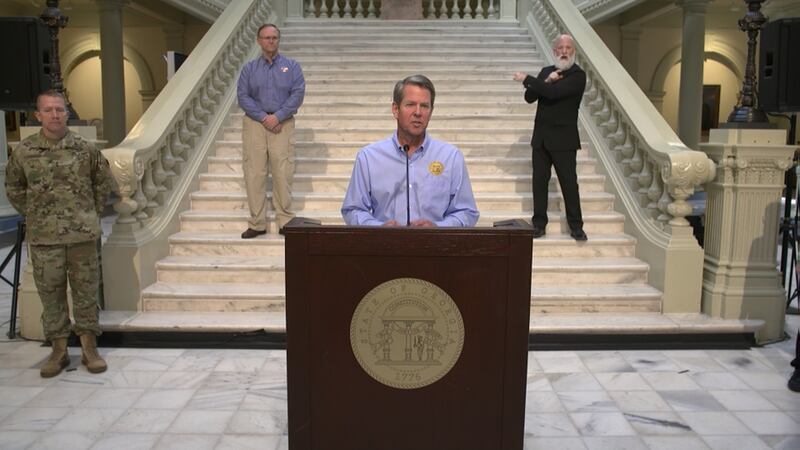ATLANTA — Gov. Brian Kemp is giving some insight into what it will take to get Georgia back to normal following the coronavirus pandemic.
Channel 2 anchor Jorge Estevez spoke to Kemp on Thursday, who said social distancing is working to help flatten the curve of coronavirus inspections.
“I feel like we are right now, but the model changes every day. Over the weekend, we had a four-day change in the model and our peak got lowered significantly,” Kemp said. “The other thing we’re following, in general, besides just ventilators and PPE, the supply chains are starting to open up on PPE so we’re in a lot better shape than we were. It’s still tight, but it’s better.”
[SPECIAL SECTION --> Latest on coronavirus in Georgia and around the world]
The governor shared the fact that hospitals still have some rooms because elective procedures are down.
To keep the need for more beds down and prevent more hot spots, other cities like Los Angeles are forcing people to wear masks in public. While the governor has not had that directive, he did weigh in.
“I do think when the economy opens back up, when you think about a barber or a hairstylist, those are going to be things, we’re going to have to take a hard look at. It may be that people are willing to wear a mask and do some out of the normal things at their establishments and we may be able to open the economy up quicker and I would be all for that,” Kemp said.
“The states are on their own to some degree when it comes to PPE. How are you prepared to deal with states like New York, Louisiana, Michigan, and cities like Philadelphia where we’re seeing these hot spots emerge. How are you competing so we here in Georgia have PPE for our front-line workers?” Estevez asked Kemp.
“I had an in-depth conversation with the vice president last Friday, a little less than a week ago, specifically about ventilators and other supplies and equipment. I felt very confident that their plan to be able to ship ventilators to states that need them 96 hours prior to that need actually occurring,” Kemp said.
RELATED STORIES:
- State says lack of guidance from feds leading to massive backups in unemployment
- Georgia sees smaller jump in coronavirus cases than yesterday
- Georgia’s primary pushed back again due to coronavirus pandemic
The governor credits hourly reporting from our area hospitals which allows us to stay ahead of the curve when it comes to medical supplies.
“We have a surplus right now. We just want to make sure we have a bed and the necessary medical equipment when the time comes, whenever we reach our peak, which we think will be in another 10 to 12 days,” Kemp said.
Testing kits are another critical medical item needed to help monitor the peak. That testing reveals minority communities could be hit the hardest by coronavirus.
“A lot has been made about minorities being more susceptible to something like this. With our state and our diversity, is that something you would consider, testing more minority communities to continue to keep this under control right now?” Estevez asked Kemp.
“That’s certainly something that’s been concerning to me. I’ve seen a lot of the news reports. The problem is, you have more than 60% of the people who are unknown, so that data doesn’t really tell you a whole lot. We’re going to continue to follow the directives of the CDC as far as things like that go,” Kemp said. “I know we’re digging in on our end to see if there are any trends or certain reasons that certain populations in this great state is effected more than others.”
Estevez asked the governor if he’s afraid of another wave of coronavirus spiking further down the road.
“We will be thinking about where we’re going to be this fall if we have a reoccurrence of the virus, how do we deal with that? how do we prepare for that? And I think Georgians can be glad that we’re thinking about that now,” Kemp said.
The governor also told Estevez that the state has purchased pod hospital units and if hospitals see a surge or we experience another catastrophe, we are better prepared for an influx of any kind of patients.
© 2020 Cox Media Group





